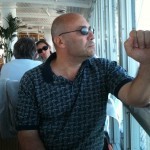Massimo Marino's Blog: The Ramblings and the Rumblings, page 16
September 22, 2014
“Christians Beware” – Ban This Book
WEIRD AND TROUBLING – “Aliens. A new super human race? Twisting Biblical scriptures? Totally not what I thought it would be! Plus an adulturous affair resulting in a new species. Christians beware! This book is not what it seems.”
Actual, verbatim review for Daimones, Vol.1 of the Daimones Trilogy appeared on Barnes & Noble on the 30th of August 2014.
appeared on Barnes & Noble on the 30th of August 2014.
Reviews, good and bad alike, are feedbacks from readers who have very specific expectations from the stories they want to read. Mind, readers are entitled to express what they feel, whether they liked a book or not. Sometimes, they also express the reasons behind that, and there’s nothing – on the surface – wrong on any review.
The review cited above, though, is worth to look at. When I first read it, I admit I thought of Fahrenheit 451 by Ray Bradbury. I never comment on any review, not even to say thank you because the reader didn’t write the review for me, but for herself and her fellow readers. I’m not supposed to be in the loop, nor I need to be. But why did I think of Ray Bradbury’s novel?
by Ray Bradbury. I never comment on any review, not even to say thank you because the reader didn’t write the review for me, but for herself and her fellow readers. I’m not supposed to be in the loop, nor I need to be. But why did I think of Ray Bradbury’s novel?
The internationally acclaimed novel Fahrenheit 451 is a set in a bleak, dystopian future. In that world, television rules and literature is on the brink of extinction. Firemen start fires rather than put them out and destroy the most illegal of commodities, the printed book. They were dangerous, they made people think. The Authority in Fahrenheit 451 dispersed its truth via televised messages, it told its story and it had to remain the only story being told. Firemen destroyed books not based on whether the book was well written or not, had grammar errors, not properly edited, or if its story didn’t flow, not even whether the story was good or not. The problem with the books was that they told a different story and shook the established truth and certitudes in readers.
But, wait a second. We’re talking here of a Science Fiction trilogy. Aliens? Well, yes, guilty as charged, Daimones has aliens. A new super human race. Yes yet again. Transgenic humans are created by aliens. Twisting Biblical scriptures? Biblical scriptures are cited, verbatim. Aliens cite them. Adulterous affair is there too, and the way it comes to reality alters what is considered ethical and moral in our society, but the characters lived a world where the society was no more. The Apocalypse had struck with unimaginable cruelty.
The words in the reviews tell us that the read was weird and troubling. I’d say for a Science Fiction novel this is already worth an Award. So, Daimones was too much to bear and shook certitudes at their roots, or the characters did hateful things, or the scriptures had been challenged: not really. How could the writer let this happen?
When that happens, to me it is the tell sign that I found a great book. When that happens, the reader had in his hands a book that has been able to stir deeply inside the deepest emotions. Yes, the book disturbed, but it spoke an unknown language and challenged the reader. Challenge was also the theme in Fahrenheit 451, challenge the authority, challenge the status-quo, challenge the society imposed with force, violence, and threats.
“’Tis the good reader that makes the good book; in every book he finds passages which seem to be confidences or sides hidden from all else and unmistakably meant for his ear; the profit of books is according to the sensibility of the reader; the profound thought or passion sleeps as in a mine, until it is discovered by an equal mind and heart.” ~Ralph Waldo Emerson
Good books are those that mark their readers, had them ‘feel’ the struggles, the internal fights, the craziness the characters went through, and make them stop: “How would I have reacted if I lived through the same events?” Whether the readers agree or not with the characters’ choices (and if they are plausible in the fictional world the character live in), those are reasons to like a good story, and readers can agree to disagree with the characters, but should also grant characters the same courtesy, to disagree with readers’ choices. After all, who would put down a killer drama because the killer… kills his victims, and sometimes in the most atrocious ways? Would you say “Beware, in this killer drama the killer kills people?”
A reader should expect to hear a different story every time, a believable one, one that makes her sad, mad, laugh, and sometimes even cry. That is the ideal, and if only one of these feelings happen, the story has not betrayed the readers, it has shaken up their firm beliefs but sometimes—oftentimes—we don’t want anyone to wake-up us from our steady, immutable dream and certitudes. But why “Christians” should beware of the Daimones? Time Danaos et Dona Ferentes comes to mind. Is the Daimones Trilogy like a Trojan Horse hiding its true motives disguised as a Science Fiction novel (you know, it portrays Aliens).
I think the rule for a writer is to surprise and tell a different story each time, one than stirs up inside and raises more questions than it gives answers. So, again, “Christians beware! This book is not what it seems.” Don’t read Daimones if you are a Christian… but, wait a second, I, the writer, went to a catholic school, served mass, and am a Christian, too. But beware, Daimones doesn’t speak about Jesus nor about religion, I’m a scientist but not a scientologist.
Don’t read Daimones if you are a Christian… but, wait a second, I, the writer, went to a catholic school, served mass, and am a Christian, too. But beware, Daimones doesn’t speak about Jesus nor about religion, I’m a scientist but not a scientologist.
Reading is difficult because it makes you think. You have to have a mind and a heart ready for it, and minds and hearts do work like umbrellas: they function at their best when they are open!
Massimo Marino has a scientific background: He spent years at CERN and The Lawrence Berkeley Lab followed by lead positions with Apple, Inc. and the World Economic Forum. He is also co-founder of “Squares on Blue”, a Big Data Analytics service company.
Massimo currently lives in France and crosses the border with Switzerland multiple times daily, although he is no smuggler.
As a Scientist, he envisions Science Fiction and went from smashing particles at accelerators at SLAC and CERN to smashing words on a computer screen.
He’s the author of multi-awarded Daimones Trilogy. 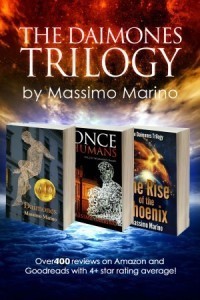
• 2012 PRG Reviewer’s Choice Award Winner in Science Fiction
• 2013 Hall of Fame – Best in Science Fiction, Quality Reads UK Book Club
• 2013 PRG Reviewer’s Choice Award Winner in Science Fiction Series
• 2014 Finalist – Science Fiction – Indie Excellence Awards L.A.
• 2014 Award Winner – Science Fiction Honorable Mention – Readers’ Favorite Annual Awards
His novels are available from Amazon, Barnes & Noble (Nook), iTunes Apple Store, and many other retailers around the world.
Join his mailing list for new releases, or follow him on Facebook, Google+, and Twitter.
The post “Christians Beware” – Ban This Book appeared first on § Author Massimo Marino.
September 19, 2014
The Earth in Daimones – An Apocalyptic Travel
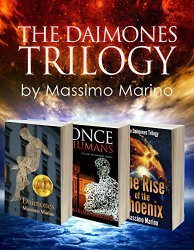
 “Even with the best of intentions, cruelty is just around the corner.“
“Even with the best of intentions, cruelty is just around the corner.“
The Daimones Trilogy deals with many themes, from survival and the rebirth of the race of man after an alien apocalypse, to love and romance in a dying world, and the rise of new ethics and morals.
Why on earth does Earth become Eridu in the “Daimones Trilogy“?
Every name in the trilogy bears a symbolic meaning. Eridu was long considered to be the earliest city in southern Mesopotamia, and is still today argued to be the oldest city in the world. Located 12 km southwest of Ur, Eridu was the southernmost of a conglomeration of Sumerian cities that grew about temples, almost in sight of one another.
In Sumerian mythology, Eridu was originally the home of Enki, who was considered to have founded the city, later known by the Akkadians as Ea. His temple was called E-Abzu, as Enki was believed to live in Abzu, an aquifer from which all life was believed to stem. Eridu, also transliterated as Eridug, means “mighty place” or “guidance place”.
And now, let’s have an imaginary travel in Eridu, visiting 28 famous places in the world, and let’s have a game together to win ebooks, paperbacks and have fun together, maybe in chatting as well, together, guessing how long it would take for the world to become as in the pictures when we will disappear. The game will last a month, some places are easily recognizable (at least 10), others much less, but all are known iconic places in the cities we’ll explore together through the post-apocalyptic pictures.
So, here’s the rules of the game.
1) Subscribe to my NewReleases mailing list to be the first to know about my new fourth sci-fi novel and receive a complimentary copy of my crime drama/horror short stories collection Stranded Love
 .
.2) Message me — in private — your guesses about the post-apocalyptic locations. You may contact me on Facebook, Google+, and Twitter, or use the contact form in this blog.
Look at the pictures (click for larger versions) and:
a) Guess at least 10 locations and win ONE ebook at your choice: either Daimones: Daimones Trilogy, Vol.1 , or Once Humans: Daimones Trilogy, Vol.2
, or Once Humans: Daimones Trilogy, Vol.2 , or The Rise of the Phoenix: Daimones Trilogy, Vol.3
, or The Rise of the Phoenix: Daimones Trilogy, Vol.3
b) Guess at least 15 locations and win TWO ebooks at your choice in the Daimones Trilogy.
c) Guess 20 locations and win the complete THREE ebooks of the Trilogy or the The Daimones Trilogy: Omnibus Edition when it will be published late October/early November
when it will be published late October/early November
d) Guess ALL the location for a paperback edition of ONE of the three volumes of the Trilogy.
And now, have fun and discover Eridu, or Earth after the apocalypse and the end of the events narrated in the first volume of the trilogy. (click on each picture for a larger version.)

Location #1

Location #2
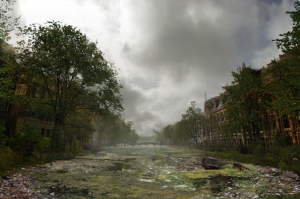
Location #3

Location #4
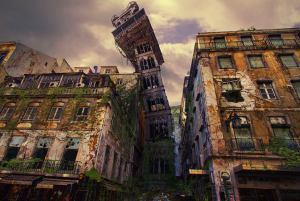
Location #5
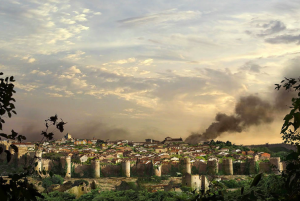
Location #6
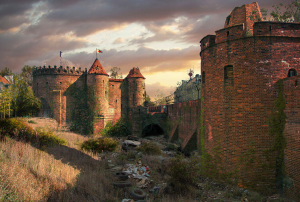
Location #7

Location #8

Location #9
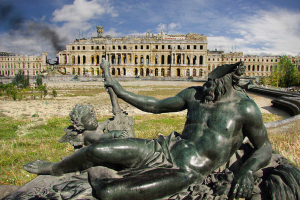
Location #10
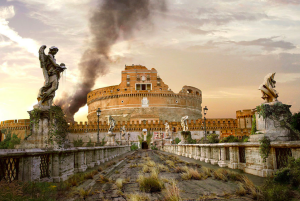
Location #11
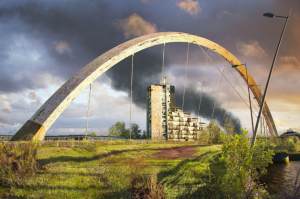
Location #12
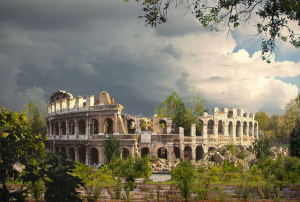
Location #13
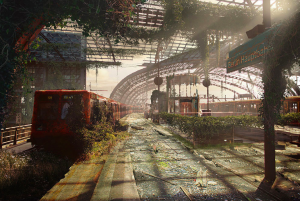
Location #14
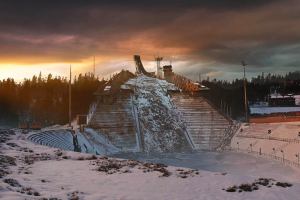
Location #15
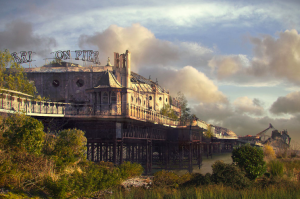
Location #16
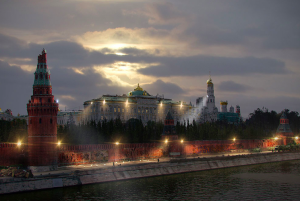
Location #17

Location #18

Location #19

Location #20

Location #21
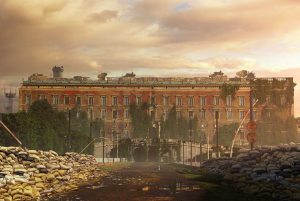
Location #22
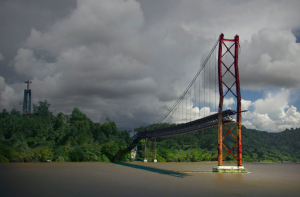
Location #23
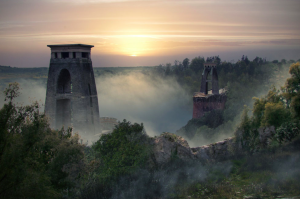
Location #24

Location #25
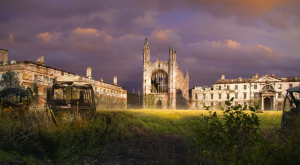
Location #26

Location #27
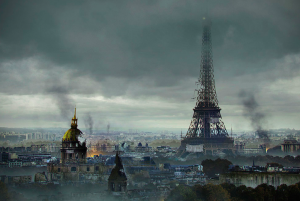
Location #28
Massimo Marino has a scientific background: He spent years at CERN and The Lawrence Berkeley Lab followed by lead positions with Apple, Inc. and the World Economic Forum. He is also co-founder of “Squares on Blue”, a Big Data Analytics service company.
Massimo currently lives in France and crosses the border with Switzerland multiple times daily, although he is no smuggler.
As a Scientist, he envisions Science Fiction and went from smashing particles at accelerators at SLAC and CERN to smashing words on a computer screen.
He’s the author of multi-awarded Daimones Trilogy. 
• 2012 PRG Reviewer’s Choice Award Winner in Science Fiction
• 2013 Hall of Fame – Best in Science Fiction, Quality Reads UK Book Club
• 2013 PRG Reviewer’s Choice Award Winner in Science Fiction Series
• 2014 Finalist – Science Fiction – Indie Excellence Awards L.A.
• 2014 Award Winner – Science Fiction Honorable Mention – Readers’ Favorite Annual Awards
His novels are available from Amazon, Barnes & Noble (Nook), iTunes Apple Store, and many other retailers around the world.
Join his mailing list for new releases, or follow him on Facebook, Google+, and Twitter.
The post The Earth in Daimones – An Apocalyptic Travel appeared first on § Author Massimo Marino.
September 17, 2014
When Also the Universe Suffered from Inflation
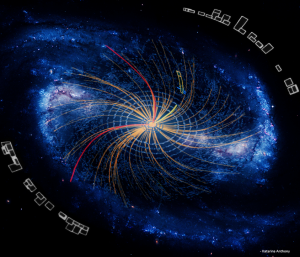
“The Higgs universe”. Image: ATLAS, NASA, ESA and The Hubble Heritage Team (STScI/AURA)
In cosmology, the term “inflation” refers to the theorized rapid expansion of the early Universe. Scientists explained inflation as caused by the presence of a spin-zero elementary particle born with the Big Bang, or the “Fiat Lux” moment. The recently discovered Higgs boson, the so-called ‘God’s particle’ is such a particle but, per se, it is not sufficient for it to be identified as the “inflation” culprit: the hypothetical particle thought to be responsible for the expansion of the Universe. For the time being, the Higgs boson is content enough to be the cause for the mass of all particles.
But what happened in the early instants of the creation, when “Fiat Lux” was pronounce? Cosmologists tell us that almost immediately after the Big Bang (around 10-35 seconds, a very short time indeed), the Universe increased in volume at a tremendous speed by undergoing an exponential expansion phase, the “inflationary” period. Following this, the Universe continued to expand, and still does, but at a slower rate.
What could have caused such a violent birth? Specialists of the field believe that a quantum field corresponding to an elementary spin-zero boson (like the Higgs boson) could, in principle, have caused such a violent evolution. Now, the Higgs boson is indeed a spin-zero elementary particle. However, that doesn’t seem to be enough. The idea that the Higgs field plays the role of the inflaton is an intriguing one, but this cannot be the case in the framework of the plain Standard Model, the main accredited understanding in Particle Physics.
The problem for the Higgs boson to play that role seems, the Standard Model suggests, to be the need a sort of “correction” in order to be part of the inflation explanation. A possible solution might be an anomalously large gravitational interaction between the Higgs field and the curvature of the space-time geometry. But this would imply the existence of still new heavy particles, probably heavier than the same Higgs boson. In other words, inflation would not be driven by the Higgs field alone (and its carrier boson), but by a combination of the Higgs field (and boson) with other, still unknown, fields (and heavy carrier new particles.)
It will be difficult for the LHC experiments to investigate the properties of the Higgs boson deeply enough to provide an answer, and the problem lies on the energy that this accelerator can reach today. However, some information could also come from cosmological experiments such as the ESA satellite, Planck. In the cosmo, there are events and particle collisions that dwarves what we can achieve on Earth with particle accelerators. Huge ‘cosmological experiments’ the Nature conducts every nano-second in the Universe, could give hints and even answers in the understanding of inflationary dynamics.
Scientist have just discovered the experimental evidence of the existence of the Higgs boson, and now need to understand its properties, and those of its field, in much more detail before anything can be said on its role in the evolution of the Universe.
In other words, it may very well be that the questions about the Higgs boson will not be answered by the LHC.
Massimo Marino has a scientific background: He spent years at CERN and The Lawrence Berkeley Lab followed by lead positions with Apple, Inc. and the World Economic Forum. He is also co-founder of “Squares on Blue”, a Big Data Analytics service company.
Massimo currently lives in France and crosses the border with Switzerland multiple times daily, although he is no smuggler.
As a Scientist, he envisions Science Fiction and went from smashing particles at accelerators at SLAC and CERN to smashing words on a computer screen.
He’s the author of multi-awarded Daimones Trilogy. 
• 2012 PRG Reviewer’s Choice Award Winner in Science Fiction
• 2013 Hall of Fame – Best in Science Fiction, Quality Reads UK Book Club
• 2013 PRG Reviewer’s Choice Award Winner in Science Fiction Series
• 2014 Finalist – Science Fiction – Indie Excellence Awards L.A.
• 2014 Award Winner – Science Fiction Honorable Mention – Readers’ Favorite Annual Awards
His novels are available from Amazon, Barnes & Noble (Nook), iTunes Apple Store, and many other retailers around the world.
Join his mailing list for new releases, or follow him on Facebook, Google+, and Twitter.
The post When Also the Universe Suffered from Inflation appeared first on § Author Massimo Marino.
September 10, 2014
The “God’s Particle” and the End of the Universe
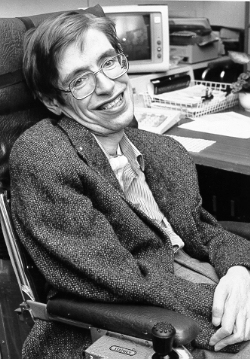 It’s the end of the world as Stephen Hawking knows it, or quite possibly the universe, period. In the preface to a new book, Starmus: 50 Years of Man in Space
It’s the end of the world as Stephen Hawking knows it, or quite possibly the universe, period. In the preface to a new book, Starmus: 50 Years of Man in Space Hawking’s collection of lectures by noteworthy astronomers and researchers, the theoretical physicist points to the Higgs boson — infamously known as the “God’s particle” — to be the cause for the universe’s eventual destruction. But how likely is that really? After all, thermodynamics also considers it possible — although improbable — for a lake to freeze in a hot summer day.
Hawking’s collection of lectures by noteworthy astronomers and researchers, the theoretical physicist points to the Higgs boson — infamously known as the “God’s particle” — to be the cause for the universe’s eventual destruction. But how likely is that really? After all, thermodynamics also considers it possible — although improbable — for a lake to freeze in a hot summer day.
Hawking notes that the particle “has the worrisome feature that it might become metastable at energies above 100bn gigaelectronvolts (GeV).” Now, though, don’t start wearing sandwich boards that say: “The end is nigh.” Not yet, at least.
The Higgs boson, discovered by physicists during experiments within CERN’s Large Hadron Collider, is a vital ingredient to explaining why things in our world have mass, and how much of it. (Don’t use this information for your diet, though.)
What exactly a theorized Higgs instability might cause? Hawking explained: “This could mean that the universe could undergo catastrophic vacuum decay, with a bubble of the true vacuum expanding at the speed of light. This could happen at any time and we wouldn’t see it coming.”
Now, CERN is not a threat (as some considered it in the past worrying for the creation of a black hole that would swallow the Earth and more.) With our knowledge and technology, a particle accelerator to reach 100bn GeV would need to be larger than Earth. CERN struggles to ensure Member States fund current research, and it is unlikely it will be funded to reach 100bn GeV in the present economic scenario. 
In short, Hawking’s fears, although theoretically valid, have the same likelihood of actually seeing, from the Mediterranean shores of Sicily, icebergs drifting by in all their majesty next summer.
Still, one wonders about Hawking’s relationship with the Higgs Boson. First, there’s the fact that he lost a $100 bet over its unearthing. Then he mused last year that now that the Higgs Boson had been identified, physics has become less interesting.
While the entire situation is unlikely to happen, Hawking has a more probable future in mind: “I don’t think we will survive another thousand years without escaping beyond our fragile planet. I therefore want to encourage public interest in space,” he said.
I concur.
Massimo Marino has a scientific background: He spent years at CERN and The Lawrence Berkeley Lab followed by lead positions with Apple, Inc. and the World Economic Forum. He is also co-founder of “Squares on Blue”, a Big Data Analytics service company.
Massimo currently lives in France and crosses the border with Switzerland multiple times daily, although he is no smuggler.
As a Scientist, he envisions Science Fiction and went from smashing particles at accelerators at SLAC and CERN to smashing words on a computer screen.
He’s the author of multi-awarded Daimones Trilogy. 
• 2012 PRG Reviewer’s Choice Award Winner in Science Fiction
• 2013 Hall of Fame – Best in Science Fiction, Quality Reads UK Book Club
• 2013 PRG Reviewer’s Choice Award Winner in Science Fiction Series
• 2014 Finalist – Science Fiction – Indie Excellence Awards L.A.
• 2014 Award Winner – Science Fiction Honorable Mention – Readers’ Favorite Annual Awards
His novels are available from Amazon, Barnes & Noble (Nook), iTunes Apple Store, and many other retailers around the world.
Join his mailing list for new releases, or follow him on Facebook, Google+, and Twitter.
The post The “God’s Particle” and the End of the Universe appeared first on § Author Massimo Marino.
September 6, 2014
Nobody Knows Anything
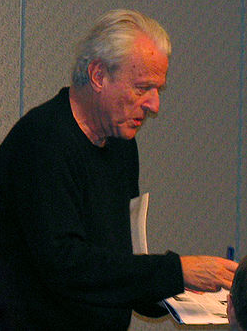 The screenwriter William Goldman is often credited for the most famous dictum about Hollywood.
The screenwriter William Goldman is often credited for the most famous dictum about Hollywood.
“Nobody knows anything,” Goldman wrote in “Adventures in the Screen Trade” a couple of decades ago. “Not one person in the entire motion picture field knows for a certainty what’s going to work. Every time out it’s a guess.”
One of the highest-grossing movies in history, “Raiders of the Lost Ark,” was offered to every studio in Hollywood, Goldman writes, and every one of them turned it down except Paramount.
“Why did Paramount say yes? Because nobody knows anything. And why did all the other studios say no? Because nobody knows anything. And why did Universal, the mightiest studio of all, pass on Star Wars? . . . Because nobody, no-body—not now, not ever—knows the least goddamn thing about what is or isn’t going to work at the box office.”
Writers, even the most famous, got rejected hundred of times and for the same manuscript, later to become a best-seller.
There is no road, for how long and impervious, that can stop a one-step-at-a-time journey. Be persistent and fulfill your dreams. I still have to fulfill mine…so never despair. And write, a lot, it is the best way to learn how to write.
If you enjoy your writing, write. If a reader gives you a 5-star, write. If another slams you with a one-star, WRITE.
People talk about the “page turner” to describe a good story, something were conflict appear at every page, almost. There’s truth in there but it is not the end of it.
A good story has to make you feel you are part of it, you turn the pages because you care and want to be reassured that something bad is not going to happen (or it is if you hate the character).
A good story should make you laugh, cry, feel sadness and happiness, move you to tears, and losing track of time. It will not happen with every reader or at the same places in the story.
If it happens here and there, to some, even one, then the story has reached its goal to please a reader, allow him to escape and live in the same lucid-dream the writer used to create a different world.
A good story will find its readers.
Nobody knows anything.
The post Nobody Knows Anything appeared first on § Author Massimo Marino.
September 4, 2014
A Scientist Envisioning Science Fiction
Posted on August 31, 2014 by Chris Graham
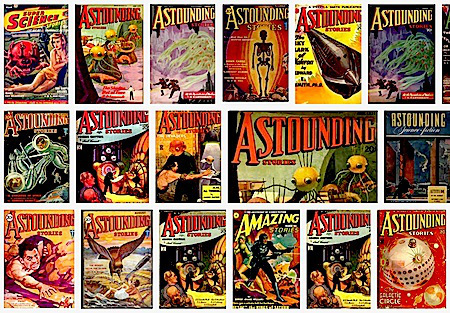 When I started writing I was too young to think of what I was doing and have moments of reflection on crafting a novel.
When I started writing I was too young to think of what I was doing and have moments of reflection on crafting a novel.
My Dad received “Astounding Stories” and I wasn’t allowed to read the magazines but they did have astounding covers; I dreamed about them. Based on those covers, I created stories in my mind, then put them down on paper with a pencil in my little hands so that I could re-read and never forget them.
I didn’t think in those days about plot and action, character development, building my voice, what themes and belief systems I had to, or wanted to cover. The place and the setting came from those cover pictures, and I wasn’t concerned with temporal or structural issues.
Later on, I stopped when I started my studies in Physics at the University. Between that and playing quarterback for the team of Palermo, my home town, chasing girls until I found my future wife thirty-four years ago, put a halt to writing. So it is only when I resumed that forgotten love and got the writing fever again—or my Muse awoke and found me ready—that I started exploring and thinking of these elements in my work.
Suspense is one thing that will keep readers reading; there’s a tension in the pages and it is not resolved: The writer has been busy building suspense. A common mistake I’ve seen with writers still learning the ropes is eagerness with resolving the tension, as if it was a good thing to provide the readers with the resolution on the same page, even; what a missed opportunity. Sure, the longer you wait, the higher the risk of disappointing your readers if the resolution is moot and weak. The readers would go “What! Is that all?”
Keep in mind that suspense is your key factor to have your book defined by readers as a “page-turner”: they want to discover what resolves the tension points in your novel. If everything is in one page, there is no need to turn anything 
You will notice something very interesting that you may use as one of your mantras while honing your storyline: Where there is revelation, there is suspense.
Revelations can fall into many categories, it can be part of the plot, a trait of your main character, an anodyne, thinly disguised detail that goes undetected by most readers, and creates “Ah ha” moments later in the story.
Try thinking of all the possible revelations in your book. How do these fit into your plot outline? If you have many to share with your readers, how can they be distributed in the storyline?
Try not to amass all your revelations together and too early in the book as you need to keep up with the expectations of your readers through some 80,000 words.
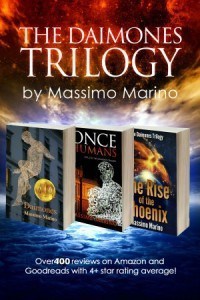 Characters are revealed through their actions, what they do and what they say. Drama shows people at their extremes. Your main character must be in the midst of the battle of his or her life, physical or emotional, or an ultimate test, a challenge or crisis of faith. As they say, “If you want to find out what a person is made of, put that person under pressure.”
Characters are revealed through their actions, what they do and what they say. Drama shows people at their extremes. Your main character must be in the midst of the battle of his or her life, physical or emotional, or an ultimate test, a challenge or crisis of faith. As they say, “If you want to find out what a person is made of, put that person under pressure.”
You’ll also will find that a place or a thing can also function as “character” and be developed. A place, or an object can be charged with emotions and tension to rival with the better developed characters of all stories. You don’t even need to describe your character physically as if you were—and you are, if you do that—telling people about a picture you have of the character. A character is not a pair of blue eyes, blonde hair, fair incarnation, slim or not, tall or short, attractive or repulsive, beautiful or ugly. These are the traits of a cardboard, not a character.
Build your character slowly, with their thoughts, their action, their unique way of interacting with the events in the story and with other characters. This gives them depth, not whether they’re tall and brunette, or short and blondie. You can even avoid telling physical characters and have the reader guess whether they are tall (she’s able to reach the upper shelve without help) or short, she needs to be on her tiptoes. Don’t even tell how they look, show who they are, and the readers will fill in the gaps. If you need a physical trait to be unique and well described (but only if it is *needed* and adds to the story) then introduce that trait *when* needed.
Everyone can describe the picture of a person and tell how s/he looks like, but that’s not character development and—frankly—doesn’t add anything to the reader’s image of who is that person. Forget physical traits, get into the characters’ personality and they will develop naturally and readers will love or hate them, but never indifferent to their fates.
Development and character—and how both are framed by time and place, and their impact on your story is also a key feature of your storytelling. It is a key aspect of your narration: where it is situated at a particular place.
When I am deep in writing a new story, I have places and situations and scenes that build up. I try to view them via a close up on something particular in the landscape, or via a long shot from a mountaintop or a helicopter or any other vantage point from above. I survey the scenery, and I forbid my characters to venture there with me. I explore, trying to “feel” the place well before my characters are allowed in. Then I walk with them, and I hear their thoughts, and question “How do you feel, here?”, “What excites you?”, “What scares you?”, and “Would you go there?” Hearing them say “No” to the last question is usually a good sign that the place needs to be visited in the story 
The plot of your book can be an attempt to illuminate a particular philosophical problem, belief, or snapshot of a world at a particular point in time. In the plot, the writer can and wants to explore underlying belief systems, whether conscious or unconscious.
Artfully understanding and using the thematic elements in your novel will result in a work that can be deep and resonant versus flat and merely 50 shades commercial. Tempting? Instead, here you aim at writing with your heart, questioning your firm foundations of your persona, and forgetting about making more sales, while concentrating on how to better disrupt something inside the reader.
 If it bothers you to explore those things, it is a good sign they are good stuff to put the spotlight on in your story. But for this, you need to have the courage to write naked. You will aim at making your work even more resonant and expansive—a book that has the potential to be appreciated by many.
If it bothers you to explore those things, it is a good sign they are good stuff to put the spotlight on in your story. But for this, you need to have the courage to write naked. You will aim at making your work even more resonant and expansive—a book that has the potential to be appreciated by many.
Voice. We’re in the habit of thinking, based on bland television and newspaper reporting, that a homogenized voice is the most objective and appropriate voice for conveying an unbiased story. That may work well for presenting a certain type of general information to the public, but does not serve the richness and color and personal nature of authentic stories, stories that live and breath what life is really like and the gamut of human experience. For this last point, the only reflection I have to share is that your voice develops as an extension of you—the writer—as a character.
When searched for consciously and purposefully it becomes affectation. Don’t fret on finding your voice, it will develop as part of who you are and if you write naked—again! The true worth of a writer is not in his style and voice, but in the feelings and sensations that come alive in the readers.
Small Bio
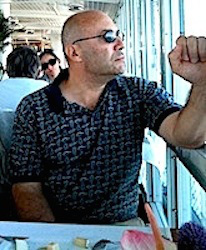 I’m Italian, and because even in Italy that means everything and nothing at all, I should say, I am Sicilian. I was born in Palermo, and as it happened with countless Sicilians, I left it, back in 1986. I lived more years abroad than in my home country, and I have changed in many and different ways than my old friends there. It is always a pleasure to go back, but it is now 6 long years since my last visit. Saudade? Maybe, a little.
I’m Italian, and because even in Italy that means everything and nothing at all, I should say, I am Sicilian. I was born in Palermo, and as it happened with countless Sicilians, I left it, back in 1986. I lived more years abroad than in my home country, and I have changed in many and different ways than my old friends there. It is always a pleasure to go back, but it is now 6 long years since my last visit. Saudade? Maybe, a little.
I lived in Switzerland, France, and the United States. I am a scientist as a background, and have spent over 17 years in fundamental research. Most of my writing are then academic stuff, and I always wonder at how much Google is able to find about everyone. I am sure one has to Google oneself so not to forget too much…
I worked for many years at CERN—an international lab for particle physics research near Geneva, Switzerland—then in the US at the Lawrence Berkeley National Lab. Fantastic moments and memories from those years. In 2005 I moved to the private sector, worked with Apple Inc., and then for the World Economic Forum.
I wrote since I was a kid, short stories and novellas, but never had anyone read it. It was a personal thing. Then, work and life took their toll and I stopped. Slightly over a year ago, for various reasons, I started again with some burning inside that needed to come out. On the first weekend I got over 15000 words, then subscribed to critters.org for peer review, lurked a year keeping on writing and getting feedback.
On September 2012 my debut novel, “Daimones”, saw the light. It received the 2012 PRG Reviewer’s Choice Award in Science Fiction. Last February it was awarded with the Hall of Fame – Best Science Fiction by Quality Reads UK, and received over 64% of the 1600+ readers votes. To the day, Daimones has sold over 5,000 copies and it’s Finalist at the 2014 National Indie Excellence® Awards (NIEA).
The sequel, “Once Humans”, was published in July 2013 and has sold more than 1,500 copies since. It won the 2014 Honorable Award in Science Fiction at the Readers’ Favorite International Book Awards.
The last book, Vol.3, “The Rise of the Phoenix” was published in May 2014.
The novels have been optioned by an Independent Audiobook Publisher in the US, Sci-Fi Publishing LCC, and both Daimones and Once Humans are now available as audiobooks too. (Available from audible.com,Amazon and iTunes).
1.) What’s the premise or the main idea of your books? (Give us a teaser)
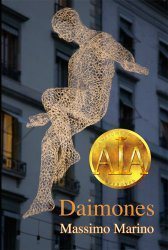 You wake up one day, take your daughter to school on your way to work and realize that the peaceful countryside and neighborhood that morning is thatpeaceful because everyone is dead. A deadly, silent invasion leaves survivors befuddled, wary, and broken. The story narrates of a first contact and an Apocalypse with roots millions of years old.
You wake up one day, take your daughter to school on your way to work and realize that the peaceful countryside and neighborhood that morning is thatpeaceful because everyone is dead. A deadly, silent invasion leaves survivors befuddled, wary, and broken. The story narrates of a first contact and an Apocalypse with roots millions of years old.
2.) What’s the genre or subgenre of this books?
It’s science fiction written by a scientist. The Daimones Trilogy deals with many themes, from survival and the rebirth of the race of man after an alien apocalypse, to love and romance in a dying world, and the rise of new ethics and morals. It narrates of a first contact and an alien colonization that set the seeds for a galactic upheaval and space wars with aliens.
3.) What inspired you to write this books?
I’ve always written stories. My dad received “Astounding Stories” at home but I wasn’t allowed to read them. The covers though… those were truly astounding for a child so I invented stories. Sci-fi visions have always haunted my dreams and reveries but physics studies and professional demanding tasks put a halt into writing and reveries. In 2011 something happened and started it all over.
4.) Name some authors who have influenced your writing style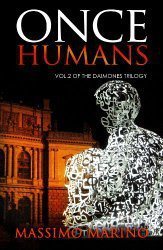 I grew up reading sci-fi, so all the big names mostly, from Isaac Asimov to Ray Bradbury, Ursula Le Guin, Frank Herbert, Larry Niven, Robert Heinlein, to name just a few and then other genres too, Tolkien, Stephen King, Tom Clancy and others. Italian authors, too, like Svevo, Calvino, Sciascia, and also Greek mythology authors, the ones I used to hate at school and that are instead fantastic writers and authors. We live with myths daily, even if we do not realize it.
I grew up reading sci-fi, so all the big names mostly, from Isaac Asimov to Ray Bradbury, Ursula Le Guin, Frank Herbert, Larry Niven, Robert Heinlein, to name just a few and then other genres too, Tolkien, Stephen King, Tom Clancy and others. Italian authors, too, like Svevo, Calvino, Sciascia, and also Greek mythology authors, the ones I used to hate at school and that are instead fantastic writers and authors. We live with myths daily, even if we do not realize it.
5.) Tell us about an interesting character or group of characters in your novels
Dan Amenta, the main character. He’s a regular guy who finds himself thrown into otherworldly situations. He falls and stumbles, he does silly things and fears the worst but he always gets back to his feet and moves on.
Then the aliens, impenetrable, only logic and little to no feelings (they shut them down in the millennia of their evolution) but they’re complex as well. And more is revealed of their complexity in Vol.2 and Vol.3.
6.) Tell us about the world of your novels. How did you develop these settings?
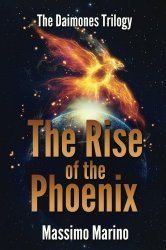 I took inspiration from what I know, places, laboratories, underground hi-tech facilities, things not everyone can see in real life.
I took inspiration from what I know, places, laboratories, underground hi-tech facilities, things not everyone can see in real life.
7.) What’s the most challenging part of writing these books?
Of writing the trilogy? It’s a complex plot, and it required research, planning, cross-checking facts and possible timelines, discussing with experts in technology and psychology.
8.) If there’s any interesting fact about your novels that you’d like to share to the people, please let us know.
It could happen… We are not alone
Amazon:
The post A Scientist Envisioning Science Fiction appeared first on § Author Massimo Marino.
I Know, I’m an Apple Junkie when…
Just learned of this Amazon offer and thought to share it with everyone. iPhone 6 is coming! Trade In Your iPhone
Timely Opportunity
With the new Apple phone announcement rumored for September 9, Amazon Trade-In is gearing up for a busy few weeks! I decided to get the most out of my old iPhone through this Amazon promotion. But, I discovered it is not limited to iPhones, we can trade in an array of eligible electronics we already own – all in one place, even in one box, along with the convenience of free shipping.
There is a 45-day lock-in period (starting 9/9-10/10) to lock in values on our phones: Apple iPhone5s 64 GB AT&T- $400* or Apple iPhone 5 64 GB Verizon- $363.55* – while we wait to buy our new device.
Interesting Trade-In Stats from Amazon
On average, iPhone Trade-in submissions spike up to 4x with customers trading in an iPhone every two minutes in the first two weeks after a new product launch
Every minute, Amazon Trade-In pays customers over $200 in Amazon Gift Cards for items they trade in
More than 30,000 Electronics items including Kindles, iPhones, MP3 players, calculators, and cameras are eligible for trade-in
The post I Know, I’m an Apple Junkie when… appeared first on § Author Massimo Marino.
September 1, 2014
Readers’ Favorite Award Winner
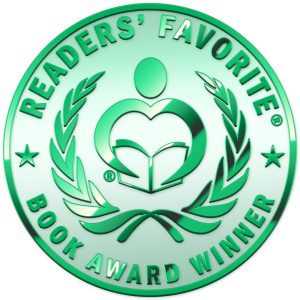 Once Humans: vol.2 of the “Daimones Trilogy” (Volume 2)
Once Humans: vol.2 of the “Daimones Trilogy” (Volume 2) is an Award Winner at the 2014 edition of the Readers’ Favorite International Book Awards.
is an Award Winner at the 2014 edition of the Readers’ Favorite International Book Awards.
This is a phenomenal recognition at a major literary contest for writers from all paths of publishing. Titles have been reviewed by the Award Judges and the contest is open to all writers, traditionally published or author published. Needless to say, competition is tough but the fact that Indie-PEN-dent authors can also be awarded is an indication that Readers’ Favorite is after quality and quality gets recognized.
Awarded books will also be featured and sold at the Award Winners booth during the Miami Book Festival this November, so it is a great recognition and exposure for all winning authors.
Here follows the original Readers’ Favorite 5-star review for Once Humans.
Reviewed by Bil Howard for Readers’ Favorite
At first it seems that the world, Eridu (Earth, as it is known by the Moirai), is at peace, in Once Humans by Massimo Marino. But things are not exactly as they appear. Humans are undergoing a transformation into becoming greater beings (transgenic beings that were created by the Moirai, which took over the planet). They are closely watched by a group called the Selected. As long as they are supported by the alien Moirai, the communities of transgenic beings grow, thrive, and are secure. All this is suddenly threatened by saboteurs called Kritas who have been in conflict with the Moirai for millennia. These aliens hope to undermine the work that the Moirai have done and control the new human race themselves. Dan Amenta, a transgenic being, is the only hope for Eridu and the transgenic community. He must pursue the Kritas through the labyrinth of tunnels and prevent them from carrying out their destruction – but first he must successfully complete the maze of logic which exists in the minds of the aliens.
The suspenseful, thrilling plot of Massimo Marino’s work in Once Humans is very well designed and is presented in great detail. The development of the characters, their emotions, and the way they react to each other makes the story move in a way that appeals to all members of the human race. The reader will find that there are many questions to be answered and many possible answers presented in a very thought-provoking manner, making this novel one to challenge the mind and draw the reader to look deeper. The reader will often feel like they are functioning within Dan’s mind and seeing what he sees. This is an excellent sci-fi thriller which is not only well thought out and very imaginative, but thrilling and captivating as well.
The post Readers’ Favorite Award Winner appeared first on § Author Massimo Marino.
August 27, 2014
Is Writing an Act of Courage, or a Leap of Faith?
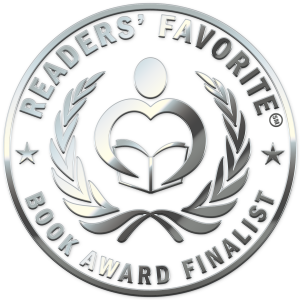
Once Humans – Best Science Fiction & Best Science Fiction Romance
“What am I doing?” Is there anyone who at one time or another hasn’t questioned why he’s hitting keys of a hot computer’s keyboard?
Do you have to dig to find the strength to keep going when you reread your work and feel it might have been better if you had hit the keys with your feet?
You forsake an evening with friends because you want to finish a poem or a story only to have someone ask, “How much are you going to make from this?” Do you fantasize strangling the speaker?
Do you wake up in the middle of the night wondering if you can ever say what you want to say, how you want to say it, when you want to say it, and summon the same demons and lure the same angels?
All writers have down moments. Sometimes these last weeks and months. I’m not talking writers block, I’m talking stomach-churning doubts that you will not be good enough. It happens to new writers. It happens to published writers who take too seriously the statement, “you are only as good as your last published piece.”
How do we get the courage to keep fighting, to keep writing? With few exceptions, writers will not experience the financial rewards that many in our societies say is the mark of success. We have to have the courage to set our own benchmark for success that reflects our values, and not those of the society around us.
There are two situations for writers. Those who have a supportive environment, be it family members or other writers (or both), have it easier than those surrounded by people who do not understand our need to write: “Why are you wasting your time?”
A fellow writer giving constructive criticism is beyond value. A family that gives you time alone to write, maybe brings you a cup of tea when they feel you need it, is wonderful. If it is family making you doubt yourself, that is harder. Wives and children may resent the time you spend ‘daydreaming’. Parents, if they are not readers or writers, won’t understand what you are doing. Disowning family, although at times tempting, may not be the best solution. Don’t try and make them understand. Write when they aren’t around and don’t discuss it. It’s an old public relations truth not to waste time on those who are negative. Work with those who are positive or — at worse — neutral.
Writers need encouragement as much as flowers need water. Try and find people to encourage you the same way you search for the right word in a sentence to convey your exact meaning.
What about the rejections? Times are a-changing. Rejections doesn’t mean anymore that you will not have readers, and remind yourself of all the great writers who have been rejected. (Jack London alone some 600 times.)
All writers have started out making all the normal mistakes: too many adverbs, too many adjectives, too much ‘there was, he was, she was verb-ing’, and telling not showing, etc. But as writers gain experience, their work becomes crisper and cleaner. Some writers, even after their work has been published or have author-published and have adoring readers, still fight doubts. They were accepted in a minor not a major literary magazine, their book didn’t sell as much as they hoped, the Publisher Weekly didn’t review their book, or Kirkus just came out with a review that is nothing more than a synopsis.
Anyone who is creative enough to write can be creative enough to wallow in self-doubt.
The problem with doubt is that it saps the energy we need to make our work stronger.
Some always ask the same question: “How do I know when I am a writer? Do I have to be published?” To me a writer is someone who needs to write, and s/he’s also an author when s/he tries to write the best s/he can and is constantly looking for better ways to conjure the visions that haunt during the night.
The post Is Writing an Act of Courage, or a Leap of Faith? appeared first on § Author Massimo Marino.
August 22, 2014
You Always Wanted To Be A Character…
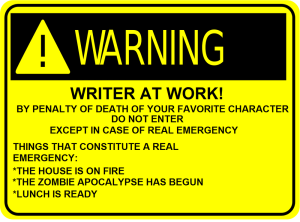 Yes, I’m writing another sci-fi novel, the 4th.
Yes, I’m writing another sci-fi novel, the 4th.
It will be a YA sci-fi, dark and urban. The main themes are “Law and Order”, racial tensions, repression for security, and love between 2 young members of different races.
It will show the struggle between what you *feel* you must do, and what you *must* do because of how you feel. Reasons of the heart vs diktats of the brain.
Principal characters:
Tancred Gilmor. Also known as “Tank”. Strong built, just graduated as Law Empath Scholar.
Mekte Yutki. Kritas, blonde, elf like female.
Location: Main Kritas planet: Ahthaza and its city capital: Utthana
Prologue – The LawFrom the Galactic Chronicles
After the war ended, and the Kritas — the former rulers of the Alliance — surrendered, the galaxy enjoyed a period known as the ‘Pax Humana’.
The fate of all known races rested on whether they had taken side with the victors, or had followed the Kritas in their grim destiny. Those who opposed the inexorable march of humans’ forces had to bend to the will of their leader, Dan Amenta of Earth. Gone were the days when the humans fought for their survival, against enemies and friends alike. The humans ruled with a strong hand, and their arms reached the most distant planetary systems, all secured with a firm grip.
The Law kept friends and foes at a distance, and the human leadership stood revered, feared, dreaded, and hated with equal proportions.
The Emphat Scholars, the enforcerers of The Law, guaranteed peace and security in all planets, and all planets were subject to the diktacts of their Tribunals. All must comply with all decisions and sentences of the Tribunal.
The Scholars have the right to say and not say, question those who crossed their path, and answer at their place in the process of their questioning. The Scholars praise and blame, abuse and insinuate, slander and undermine even the strongest of the wills. The ones under trial, those under the full weigh of the Law, have the duty to suffer in silence and stillness, and open their minds to the inquisitive Scholar. This is the fundamental rule of The Law. These are the foundations of the ‘Pax Humana’.
And now this is my game: Be one (and only one) character in the novel which is now in work and which will appear in 2015. Character can be male or female, but a reader who wants to die must in this case be male. In any case, I’ll require a bit of physical description, including any nickname (can be made up, I don’t give a rip).
What do you have to do for the chance to become a character?
Subscribe to my mailing list (and receive a free short story collection);
Get the bestseller, multi-awarded sci-fi novel “Daimones” – Vol. 1 of the “Daimones Trilogy” FREE from:
Amazon in UK, Smashwords, Barnes & Noble, iTunes, (and maybe read it, too)
AND
support me in this thunderclap project (again free, just a click) to make Amazon US have you get Daimones for FREE.
The only trackable items — where your support will show up — is the mailing list when you subscribe, and the thunderclap project.
The most interesting, and better conceived character will be part of the novel, and announced in these pages at the end of September.
The post You Always Wanted To Be A Character… appeared first on § Author Massimo Marino.


